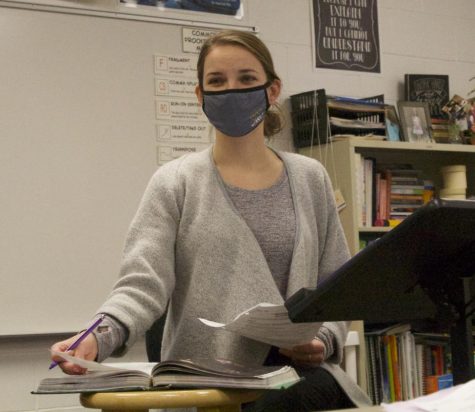Do we talk about COVID too much?
Student argues that we need to look at the positives to life
Throughout these troubling times, the American people have had one thought on their minds almost constantly: COVID-19. This doesn’t necessarily need to be restated, though. Chances are that nearly anyone who decides to read this article has heard the same message day in and day out: COVID is bad, and the world needs to fight against it.
While this is an important message to spread to everyone, there are some who would argue that we’ve talked about COVID to a fault. This isn’t to say that it’s not dangerous but rather that we’ve sacrificed a bit of ourselves by focusing all of our attention on it.
By placing such an emphasis on COVID news compared to other news, the general public is exposed to more pandemic-related news. According to an American Psychological Association article on the effects of COVID news, “Media exposure during the 24/7 news cycle can increase perceptions of threat and activate the ‘fight or flight response.’” Furthermore, the article goes on to state that “anxiety increases in the face of an uncertain or uncontrollable threat.” While these consequences are unavoidable if we want to educate the public on COVID, their effects could be lessened in a variety of ways.
To start, news sources could try to stop using buzzwords in COVID-related media. Instead of sensationalizing stories with titles like “Deaths Rampant as COVID Claims the Midwest,” they could lean more positively toward a “Lives Lost as Midwest Battles COVID.” This isn’t to say that the first title was bad or inaccurate but rather that it puts emphasis on the negative aspects of the story, giving the reader cynical connotations before they’ve even scanned past the title. This would ease the stress that many people feel daily from reading such negative news, and in turn, things may feel a bit less overwhelming.
Secondly, the public could be more careful about where they get their information. Social media sites such as Facebook and Twitter are all too familiar with the concept of “fake news.” And, if anything, fake news has become an epidemic in its own right. In order to stop the spread of misinformation and mass hysteria, social media users should make sure that the news that they’re getting is from a trusted source.
Finally, everyone could use a break from the news every once in a while. By taking a step back and focusing on things other than the pandemic, mental health can be improved significantly. Take a walk. Find a hobby. Watch a new show. There are plenty of ways for stressed-out people to distract themselves from the world at large.
Ultimately, while COVID remains a real danger that should be taken seriously, people should still attempt to see the positive sides of life.
Your donation will support the student journalists of Yutan High School. Your contribution will help cover our annual website hosting costs, as well as allow us to purchase equipment and produce more in-print editions.
Kaden is a senior in his second year of journalism. He enjoys writing almost anything, but especially editorials and columns. Outside journalism, Kaden...






